News Flash
News Flash

TBILISI, Dec 29, 2024 (BSS/AFP) - Salome Zurabishvili was a French diplomat before entering the turbulent politics of her ancestral homeland, where she was elected Georgia's first woman leader in 2018 and became the beacon of Tbilisi's EU aspirations.
The Georgian president, 72, has been embroiled in a fierce feud with the ruling Georgian Dream party and has backed massive anti-government protests.
Born in Paris to a Georgian family who fled Bolshevik rule in the 1920s, Zurabishvili has accused the government of steering Tbilisi back towards Moscow and acting on Russian orders.
"We are witnesses and victims of a Russian special operation, a modern form of hybrid war against the Georgian people," she declared after contested parliamentary elections in October.
For tens of thousands of protesters, Zurabishvili represents hope against an increasingly repressive government that has adopted a series of Kremlin-style laws.
She has demanded a re-run of the October polls, which she says Georgian Dream "stole" and vowed to stand by pro-EU protesters staging daily mass rallies since November 28, when Georgian Dream made its shock announcement that it will shelve EU accession talks until 2028.
- 'Only legitimate leader' -
On December 14, an electoral college controlled by the ruling party installed its loyalist, far-right former footballer Mikheil Kavelashvili, as the country's next figurehead leader.
But Zurabishvili, whose mandate was meant to end on Sunday with the new leader's inauguration, has refused to step down until the government organises fresh parliamentary elections.
"The elections did not happen -- not only because they were illegitimate, but because they have not been recognised by you and by our foreign partners," she told tens of thousands of anti-government protesters last Sunday.
"There is only one formula to resolve such a crisis, one universally recognised in every democratic country: new elections," she said to the crowd's wild applause, vowing that she would "not surrender" Georgia's EU path and calling on Georgian Dream to "negotiate" on the date of new polls.
It remains unclear how Georgian Dream will react if Zurabishvili refuses to leave the presidential palace.
Many protesters have vowed to defend her against any attempted eviction from office.
Prime Minister Irakli Kobakhidze threatened her with "many years of imprisonment" if she does not vacate the Orbeliani Palace, the presidential seat.
Refusing to recognise Kavelashvili's legitimacy, opposition parties have said Zurabishvili remains the country's "only legitimate leader".
- Pro-EU -
Moving Tbilisi closer to Europe has been a lifelong goal for Zurabishvili, who was not always at war with Georgian Dream.
She was elected with the support of billionaire Bidzina Ivanishvili, Georgia's most powerful man and the ruling party's founder.
Georgians backed Zurabishvili in the polls despite her outsider status and mistakes when speaking Georgian.
"It is now important to show that this country has chosen Europe," she declared after she was first elected.
"For that purpose, Georgians have elected a European woman as president."
But when the government began deviating from its pro-EU path in 2022, Zurabishvili turned into Georgian Dream's most outspoken critic.
She has vetoed several controversial laws targeting civil society, independent media, and LGBTQ rights -- all of which Brussels warned would undermine Georgia's prospects of joining the EU.
Infuriated Georgian Dream lawmakers have twice failed to impeach her.
- 'Superwoman' -
Fighting Russian influence in Georgia is in Zurabishvili's blood.
She is a descendant of Niko Nikoladze, a prominent writer who called for Georgia's independence from the Russian Empire.
Zurabishvili had a 30-year career in French diplomacy, with postings at the United Nations, Washington and Chad, before serving as France's ambassador to Tbilisi.
After the bloodless 2003 "Rose Revolution", Georgia's reformist then-president Mikheil Saakashvili -- now in prison -- appointed her as foreign minister, approving the move first with Jacques Chirac, France's president at the time.
But she quickly fell out with Saakashvili's camp, accusing it of democratic backsliding.
Thousands took to the streets to protest against her dismissal in 2005, chanting: "You are our superwoman!"
In her 2006 book "A Woman for Two Countries", she wrote: "Now, I have to engage in a political battle, which has never attracted me, which I never practised, which is being imposed on me."